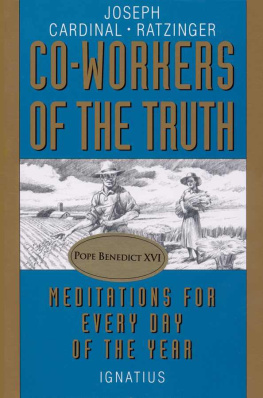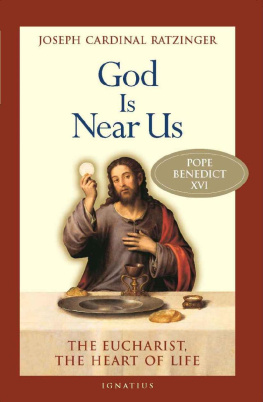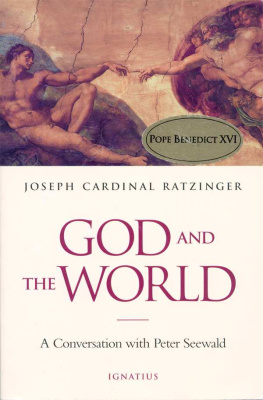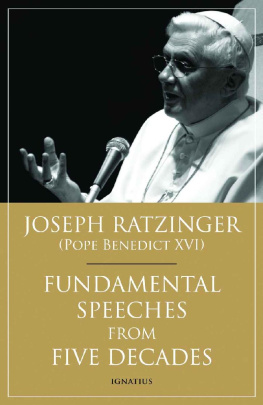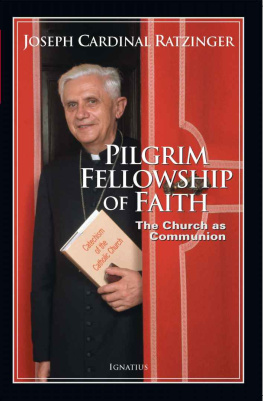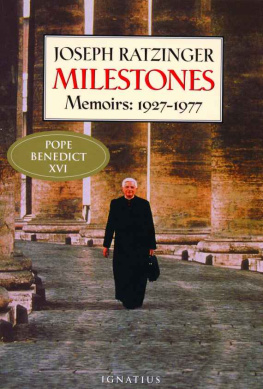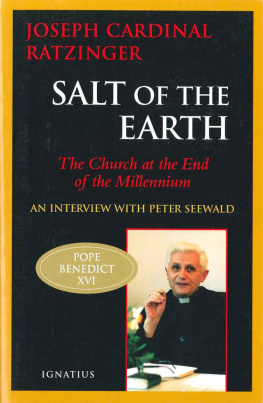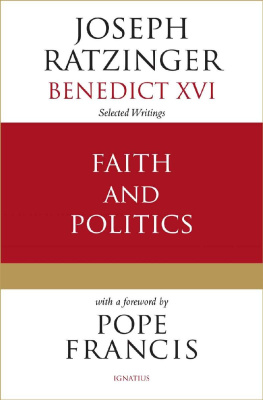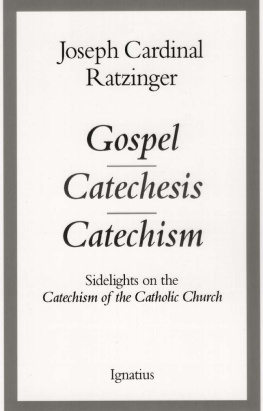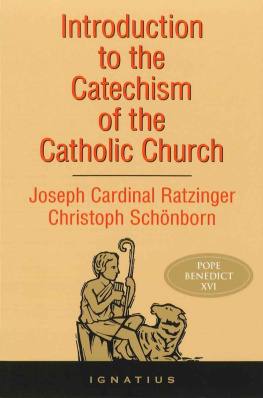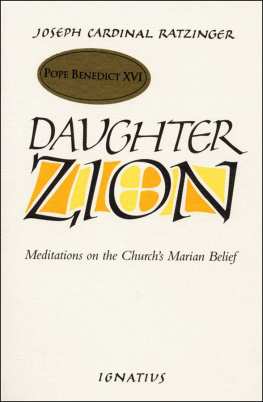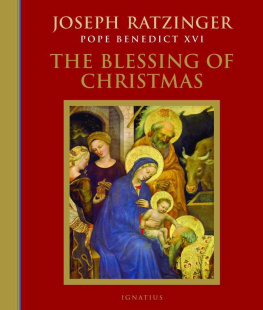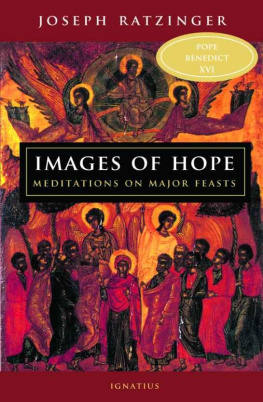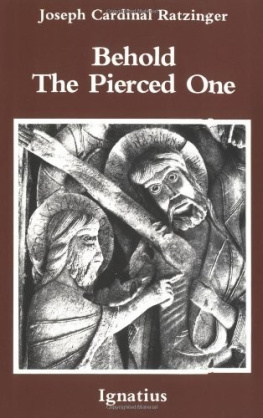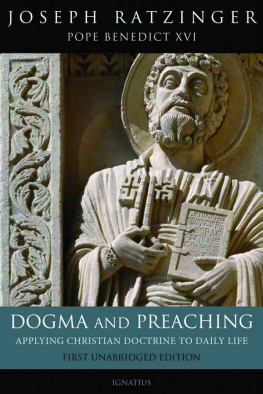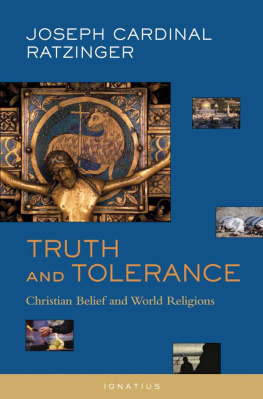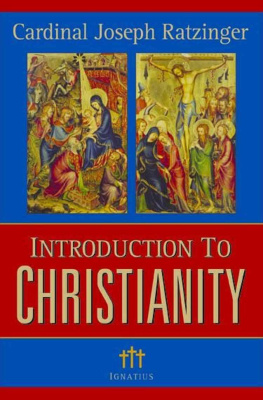CO-WORKERS OF THE TRUTH
JOSEPH CARDINAL RATZINGER
Co-Workers of the Truth
Meditations for Every Day of the Year
EDITED BY
SISTER IRENE GRASSL
Translated by
Sister Mary Frances McCarthy, S.N.D.
and
Reverend Lothar Krauth
IGNATIUS PRESS SAN FRANCISCO
Title of the German original:
Mitarbeiter der Wahrheit: Gedanken fr jeden Tag
1990 Verlag Johann Wilhelm Naumann, 1990
Wrzburg, Germany
Cover art by Christopher J. Pelicano
Cover design by Roxanne Mei Lum
With ecclesiastical approval
1992 Ignatius Press, San Francisco
All rights reserved
ISBN 0-89870-409-x
Library of Congress catalogue number 92-71960
Printed in the United States of America
CONTENTS
PREFACE
Soon after my consecration as bishop in 1977, Sister Irene Grassl approached me with the suggestion that I compile from my various writings a kind of breviary of reflections for each day of the year. The title finally chosen for this compilation also conveys my reason for undertaking it: I believe that a work of this kind can, in its own way, contribute to the fulfillment of the promise implicit in the motto from the Third Epistle of Saint John, verse 8, that I adopted for my coat of arms: Co-Workers of the Truth. For John, these words signify the participation of all the faithful in the service of the Gospel and, by consequence, the catholic dimension of the Faith: the elder, as he designates himself, calls upon the faithful to extend hospitality to all who come as messengers of the Faith. In doing so, he cautions against the self-isolation of communities that regard themselves as closed circles; he equates the refusal to offer hospitality to missionaries with a rejection of catholicity and a repudiation of the truth. By comparison, the act of love whereby the faithful provide food and shelter for itinerant messengers of the Faith is a service to the truth. By their love, they make possible the proclamation of the Gospel and so become, in their turn, co-workers of the Gospel. Thus we encounter in this brief phrase the interweaving of truth and love, of personal faith and the catholicity of the Church, as well as the interrelationship of ministers and faithful who, in their different ways, share together the burden and the grace of the Gospel.
A phrase of such breadth and depth is relevant in a variety of contexts and always offers new perspectives. For me it has become another way of expressing the task of the bishop: he too, and especially he, is a co-worker, that is, he does not act in his own name but is always and totally linked to a with. Only when he acts with Christ and with the whole believing Church of all times and all places does he do what he is meant to do. It is not his task to fashion a community for himself, but, rather, to fashion the Church for Christ. That means that he must point to him who is the Way because he is the Truth (Jn 14:6). For the simple reason that it comes from the truth and leads to the truth, the love that is the goal of faith is, in a very real sense, the hope and redemption of the human race. A mere community of interests without truth would be just a drug, not a healing. Perhaps, in the last analysis, the crucial element in the unfathomable expression co-workers of the truth is the relationship between truth and love.
It is my hope that this book will indeed prove to be a co-worker of the truth. It seeks your hospitality and invites you to co-think and co-believe with it. It would like to open windows through which we can look upon the truth of the Gospel. It would like to awaken in us the courage to become co-workers, and it would like to be an aid to that love that the Lord has laid upon us as his commandment (Jn 13:34).
I extend cordial thanks to Sister Irene Grassl for the great patience and effort required to assemble from a multiplicity of works those passages that would be useful for such a breviary. May her efforts bear fruit and help many readers to learn anew what it means to be a Christian.
Joseph Cardinal Ratzinger
Munich
PREFACE TO THE SECOND GERMAN EDITION
More than a decade has passed since this book made its first appearance. Through its spiritual reflections it has been able to help many persons on their journey through the year and has extended its influence even into foreign countries by virtue of the translations that have been made. In the meantime, the development of Church and world has not stood still. In the spiritual realm, we have witnessed not only upheavals, but also new and hope-inspiring changes in which the thirst for the truth of God has been most urgent precisely in those areas in which it had long been considered dispensable or even harmful. For the proclamation of the Gospel the events of these years have posed new challenges that I have tried to meet in a variety of contexts. From the harvest of the last decade, Sister Irene has, with great dedication, collected for this second edition new texts to replace old ones and to reflect what is current in the life of the Church without changing the basic form of the book. I would like to express to her my most cordial thanks for the trouble she has taken and the patience she has shown in the preparation of this new edition so that the reader may encounter here day by day both the always valid and the presently current aspects of faith.
Joseph Cardinal Ratzinger
Rome
JANUARY
January 1
T o usher in the new year, the Church places before us a text from Saint Pauls Epistle to the Galatians:... Because you are children, God has sent the Spirit of his Son into our hearts, crying, Abba! Father! She offers this word as a word of encouragement to help us enter with confidence into a future whose ways we cannot know. The following passage, too, is intended as a guide for what lies ahead: So you are no longer a slave, but a son; and if a son then also an heir.... In these words we find revealed the ultimate substance of our future: as heirs of God we will be masters of the universe. Greater than this can hardly be predicted of us. Yet it is difficult for us to make our own the hope that impregnates this text. We lack the simplicity that would enable us to stammer Abba. In fact, there is, in us, a resistance to saying Father that springs from our longing to come of age. The Father no longer seems to us, as he did to Saint Paul, the guarantor of our freedom, but rather the opposite. What we want is a partner; father is too suggestive of authority. We are like the younger son who claims his inheritance and no longer wants a father, but only a future that he creates for himself. How well this single brief text, the New Years gift that the Church bestows on us, reveals the whole struggle of being a Christian today. It runs counter to much that we take for granted; it calls for conversion. And yetif we have the courage to reflect on it, it is perhaps not really so hard to understand. In the last analysis, one who must create himself cannot fail to discover his helplessness. He has no choice but to become a robot in an overwhelming universe and in a society that mercilessly thwarts all his plans. One who can say Father to the Lord of the Universe has a firm foundation for his confidence. The future belongs to him. Why should it not be possible for us to experience, even in our own day, the infectious power of this confidence?
From: Die Hoffnung des Senfkorns , pp. 7-8
January 2
F or everything there is a season, and a time for every matter under heaven: a time to be born and a time to die; a time to plant and a time to pluck up what is planted;... a time to weep and a time to laugh; a time to mourn and a time to dance (Qo 3:1-4). Not everything is appropriate at all times; the human being needs a rhythm, and the year gives him this rhythm, both through creation and through the history which faith sets forth in the yearly cycle. This brings us to the Churchs year, which enables man to go through the whole history of salvation in step with the rhythm of creation, simultaneously ordering and purifying the chaotic multiplicity of our nature.
Next page
